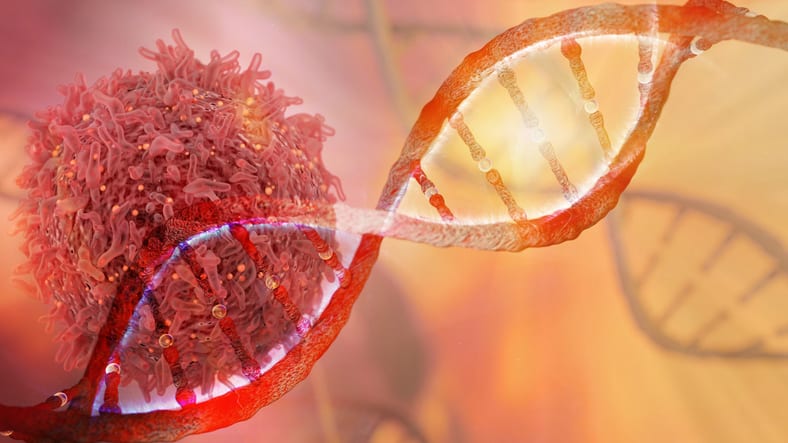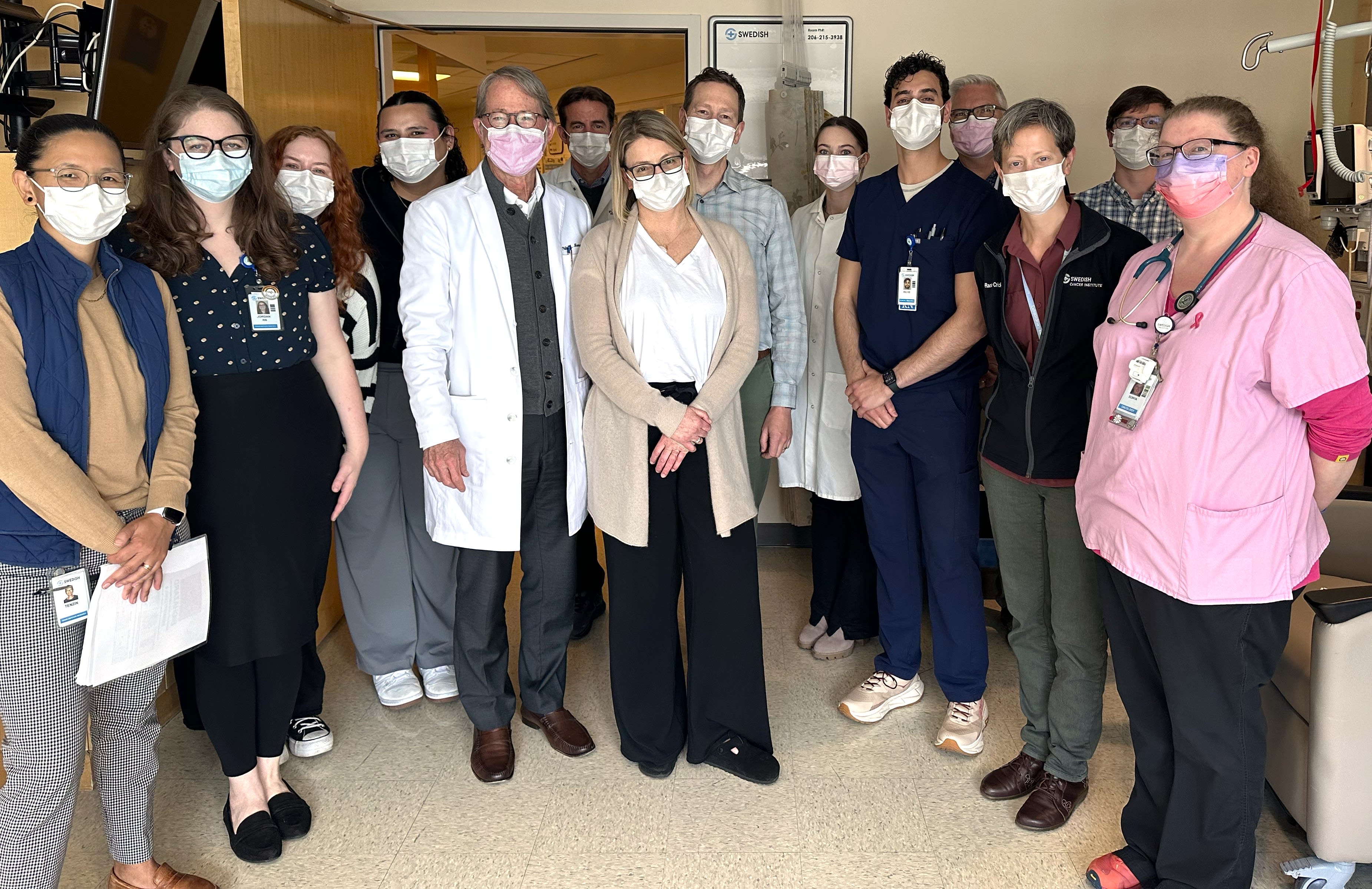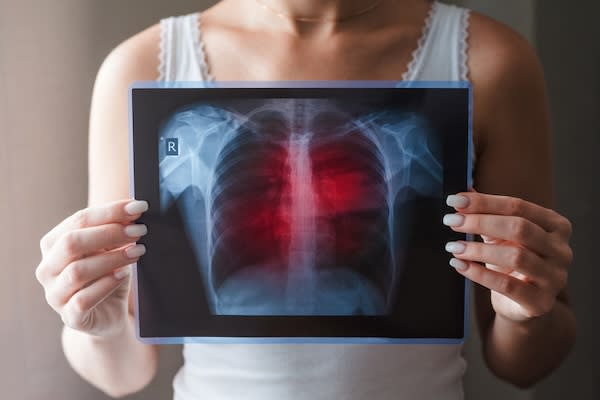Cellular Therapies
Innovative, Advanced, and Customized
At the Providence Swedish Cancer Institute, innovation drives everything we do — but compassionate care is at our heart. As one of the region’s only centers for advanced cellular therapies, we’re pioneering treatments that harness your own cells to fight blood disorders. Together, we’ll craft a care plan that’s as individual as you are — built around your needs and your goals.

Pioneering the Future of Cancer Treatment
The Providence Swedish Cancer Institute is at the forefront of cellular therapy, offering some of the most advanced blood disorder treatments available today. As one of only two providers in the state offering CAR T-cell therapy, along with other leading-edge options, we’re transforming cancer care by using the power of your own immune system to fight the disease.
Our hematology, oncology, and supportive care teams collaborate to provide the most effective, well-rounded treatment, using groundbreaking therapies and the latest innovations in treating hematologic conditions — including blood disorders and blood cancers.
Advanced Cellular Therapies Treatment
We offer leading-edge therapies that deliver effective treatment with a focus on your overall well-being and quality of life. Therapies include:
Blood disorder and cellular therapy treatments
For patients with non-cancerous bleeding and clotting disorders, advanced therapies offer exciting new treatment possibilities.
Interventional radiology (IR) uses advanced imaging technology to perform minimally invasive procedures, often through a small surgical incision. IR is used to perform biopsies, as well as treatments like ablation or embolization, which can help shrink tumors. Treatments can sometimes replace the need for traditional surgery, offering patients less pain, lower risk and faster recovery times.
Red blood cell disorders, such as sickle cell disease, anemia, and polycythemia, affect how oxygen is carried throughout your body. By replacing or modifying defective cells, cellular therapies like stem cell transplantation can help restore normal red blood cell production, reducing symptoms and improving your quality of life.
What to Expect
Cellular therapy is a highly personalized treatment that uses your body’s own cells to fight blood disorders. The process takes time and involves careful preparation, but our team is here to provide the support and guidance you need from your first appointment through your recovery. Here’s what you can expect.
Before starting treatment, you meet with your care team for evaluations and testing to ensure you’re ready. This may include lab work, imaging, or procedures such as stem cell collection, bone marrow biopsy, or central line placement. Your team also provides guidance on nutrition, physical activity, and any necessary medication adjustments. This is a great time to ask any questions, so you feel prepared and confident before beginning therapy.
In the days leading up to treatment, you may have conditioning therapy, such as chemotherapy or immunotherapy, to prepare your body for your cellular therapy infusion. This helps create the best environment for your new cells. You may also take medications to manage side effects or prevent infections. Our team closely monitors your health and provides supportive care, so you’re ready for your cellular therapy.
Cellular therapy infusion is a straightforward outpatient procedure. A small, flexible IV catheter is placed into a vein, usually in your arm or through a central line if you have one. The specially prepared cells are then infused slowly into your bloodstream over a short period, typically less than an hour. You won’t feel the cells, but you may experience mild side effects, such as chills or a slight fever, as your immune system responds.
After your infusion, our team closely monitors your recovery and helps manage any side effects. Some reactions, like cytokine release syndrome (CRS) after CAR T-cell therapy, are rare but can be severe and require prompt medical attention. Symptoms may include fever, low blood pressure, or flu-like effects. Our expert team is trained to recognize and treat these issues quickly to ensure your comfort and safety. We also provide guidance on ongoing care and when to seek additional support.
We offer holistic care options during and after treatment to support your physical and emotional well-being. Our cancer rehabilitation program is one of only a few cancer rehabilitation programs offered nationally, and it's led by a fellowship-trained cancer rehabilitation specialist. Cancer rehabilitation can include physical and occupational therapy; nutrition management; speech therapy; and lymphedema therapy to address fluid buildup, a side effect of radiation or surgical procedures.
Frequently Asked Questions
You may receive care from board-certified specialists in hematology, medical oncology, and radiation oncology.
Our multidisciplinary team also includes oncology nurses, pharmacists, physical therapists, and other cancer experts who support you throughout your care. Your physicians work closely together — participating in cross-departmental tumor boards with other Providence Swedish specialists — to create a treatment plan tailored to you. Although your care is team-based, you’ll continue to have regular appointments with your lead physician, who stays closely involved and helps coordinate your treatment every step of the way.
Treatment timelines vary depending on your diagnosis.
Medical oncology and radiation treatments typically involve multiple treatment sessions over a period of days or weeks. Treatment timelines vary depending on the type and stage of your cancer. Your care team reviews your treatment plan with you, as well as any options that may impact length, frequency, and duration of treatment.
Following active treatment, you will see your physician periodically to monitor any signs of recurrence.
Chemotherapy is typically given through an IV in cycles over several weeks or months. It can be used prior to surgery to shrink tumors or following surgery to reduce the risk of your cancer returning. At the Providence Swedish Cancer Institute, your care is led by a medical oncologist and supported by a dedicated team - including nurse practitioners, physician assistants, pharmacists, and nurses who coordinate your care and help manage any side effects. You'll have regularly scheduled visits, and if you need help between appointments, same-day support is available.
Radiation treatments are typically delivered over several sessions to target cancer cells while protecting healthy tissue. Your radiation oncologist will schedule a planning session to map specific treatment areas using imaging scans. Throughout your care, your team monitors your progress, manages side effects, and provides resources and support to ensure you feel comfortable and informed.
Blood cancers often require a combination of approaches to achieve the best outcome, so it’s likely your care plan could include more than one type of treatment.
Chemotherapy, radiation therapy, or targeted therapy may be needed to target cancer cells throughout the body, reduce the risk of recurrence, or improve overall effectiveness. Our hematologic cancer experts tailor treatment to your specific diagnosis, working to achieve the highest likelihood of success.
Some hematologic cancer treatments, such as chemotherapy, can affect fertility. These effects could be short-term, but there is a chance that you might experience them permanently.
If you're concerned about fertility, our team will guide you through options, discuss the potential impacts of your specific treatment plan, and connect you with fertility preservation resources to help you make informed decisions about the future.
Patients have access to hundreds of clinical trials involving most cancer types. We are often among the first in the U.S. to provide access to Phase 1 trials — the first stage of evaluating treatments in humans. Please note, we open new trials often. Check with your clinician for the latest in upcoming trials.
Learn more and find out if a clinical trial could become part of your treatment plan.
We provide a full range of supportive care services to support you during and after your cancer treatment. Some of these services include:
- Art therapists
- Cancer rehabilitation (onco-physiatry)
- Care coordinators
- Genetic counseling (cancer geneticist)
- Health educators
- Medical massage (edema, lymphedema management)
- Music therapist
- Naturopaths
- Nutritionists
- Oncology nurses
- Social workers
- Speech and language pathology
We can also help with finances, food, transportation, and other challenges for eligible patients through our patient assistance fund.
See the full list of supportive care services.
Note: Some services are provided by local partners and vary based on location. Please contact your clinic for more information.
News & Info From Our Experts






